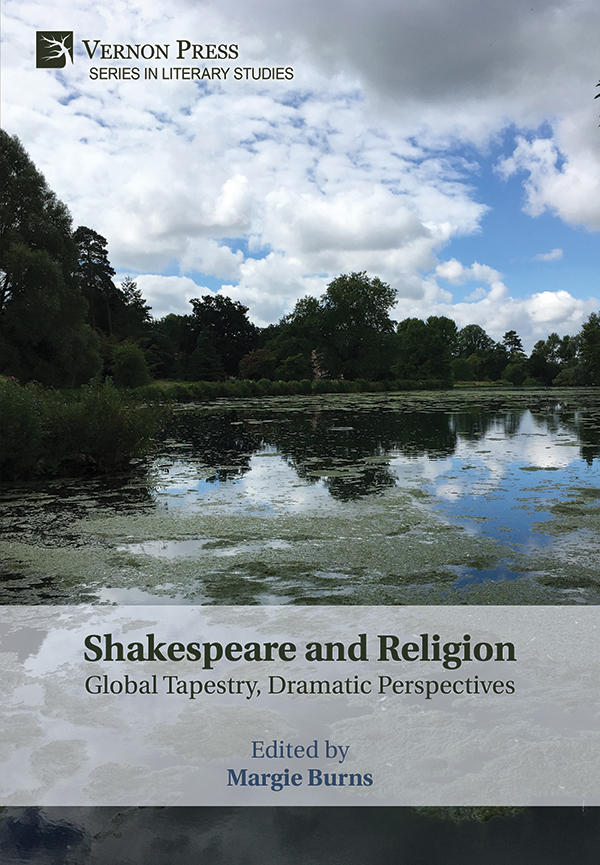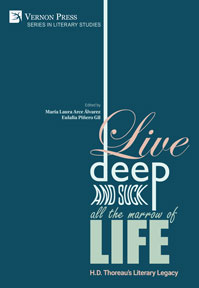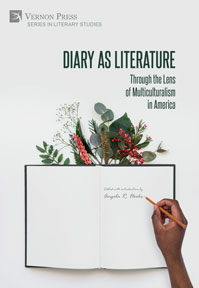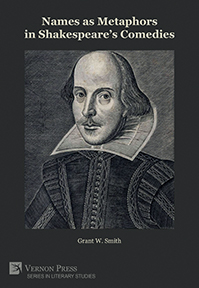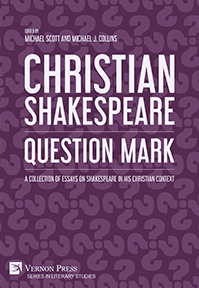Shakespeare and Religion: Global Tapestry, Dramatic Perspectives
Margie Burns (Ed.)
by Jennifer Basye Gilstrap (Piedmont University in Demorest, Georgia), Jay Zysk (University of Massachusetts Dartmouth), Michele Osherow (University of Maryland, Baltimore County), Shandi Stevenson , Giacomo Ferrari (University of Florence, Italy), Milo-Rhys K. Teplin di Padilla (SWCA), Kelsey Ridge (Alvernia University), Annalise Benjamin (University of Colorado, Denver), Camilo Peralta (Joliet Junior College), Margie Burns (University of Maryland, Baltimore County), Travis J. Knapp (Valley State University), Caroline Weisenthal Lion (University of California, Irvine)
Purchase this book
(click here to change currency)
Religion informs all the Bard’s writing. In his plays, the transcendental may execute justice according to different faiths, separate dissembling from conversion, offer a pathway to salvation, diffuse the Gods between Homer, Rome, Israel, Islam, fairies, devils, Popes and Protestants: intervening and confusing characters and audiences, then and now. The spiritual inflects history, comedy, romance, and tragedy—as classical hubris or Pirandello’s modern “hole torn in a paper sky.” These inspiring, learned, moving essays can floodlight classrooms and stages: they contribute vividly to recent reassessments of religious foundations in literature and art.
Robert L. Patten
Lynette S. Autrey Professor Emeritus in Humanities and Emeritus Professor of English
Rice University
“Shakespeare and Religion: Global Tapestry, Dramatic Perspectives”, edited by Margie Burns, offers a treasure of historical research and innovative approaches to the question of the connection of religion to Shakespeare’s plays. Rather than arguing for Shakespeare’s beliefs, the essays in this volume remind us that sixteenth- and seventeenth-century Britain was a marketplace of ideas as well as a cosmopolitan community of global peoples. From the ancient gods of Homer and Ovid to Jewish conversion narrative and Hebrew mysticism, from the ancient division between pagan and Christian and the recent division between Catholic and Protestant, to an African setting influenced by Coptic Christianity or Muslim teachings, this volume portrays a Shakespeare who drew on a varied knowledge of religion to give his audience glimpses of divine justice or injustice, yet also hope.
Jane Donawerth
Professor emerita
University of Maryland
This collection of essays, all of them new, is an interesting and stimulating one that demonstrates the continuing life in its venerable topic. The individual contributors go beyond the traditional and much-debated questions of Protestant vs. Catholic, sometimes visiting surprising places on the map (medieval Judaism, Coptic Christianity), occasionally making sharp interventions into today’s news, more generally insisting on religion not as a matter of sectarian identification but as an elevated level of concern, a matter of giving attention to what finally most matters in human life. Shakespeare’s works indeed deserve and reward reading at this level, as these essays show in sometimes unexpected ways.
Gordon M Braden
Professor Emeritus
Department of English
The University of Virginia
Twelve research articles deal with aspects of religion in the plays of William Shakespeare, from early in the dramatist’s career to the end. Ordered by chronology, two chapters focus on history plays; three chapters focus on comedies and three on tragedies; one deals with "Troilus and Cressida," and three chapters deal with the late romances. The anthology does not cover all of Shakespeare’s plays and collaborations or the lyric poems.
The collection is ecumenical and transnational. While the contributors all recognize that Shakespeare wrote in a Renaissance Christian universe, Christianity is not the only world religion dealt with. Approaches involve history and philosophy as well as theology, and individual perspectives vary. One thing the collection makes clear is that religion, in some sense, operates in every Shakespearean work, and its large spectrum ranges through plot and character from shallow to deep, self-interested to elevated, bloody to harmonious. Religion and religious differences were also part of the fabric and history of the playwright’s world, manifesting in the plays in situation, language, and iconography. From various perspectives, a common denominator is that the authors approach aspects of religion as one element in an informed analysis of the works.
Introduction
Chapter 1
From Comedy to Classicism: Taming of the Shrew as Early Modern Metamorphoses
Jennifer Basye Gilstrap
Piedmont University in Demorest, Georgia
Chapter 2
Hypocrisy, Dissembling, and Devotion in Shakespeare’s Richard III
Jay Zysk
University of Massachusetts Dartmouth
Chapter 3
The Problem of Conversion in Shakespeare’s Merchant of Venice
Michele Osherow
University of Maryland, Baltimore County
Chapter 4
“Some Shall be Pardon’d, and Some Punished”: Christian Eschatology in Shakespeare’s Plays
Shandi Stevenson
Independent Scholar
Chapter 5
“Night’s predominance or the day’s shame”: A Shakespearean Constellation of the Modern Tragic
Giacomo Ferrari
University of Florence, Italy
Chapter 6
Shakespeare Rewrites Homer: The Bard Imagines the Religion of Ancient Greece and Rome
Milo-Rhys K. Teplin di Padilla
Staff Archaeologist, SWCA
Chapter 7
“Christian and Heathen”: Othello and the Coptic Church
Kelsey Ridge
Alvernia University
Chapter 8
Conflicting Loyalties and Reclamation in Othello: Metamorphosis of Religious Identities
Annalise Benjamin
University of Colorado, Denver
Chapter 9
“Spirits from the Vasty Deep” and Other Manifestations of Evil
Camilo Peralta
Joliet Junior College in Joliet, Illinois
Chapter 10
Religion and Reconstitution in Cymbeline
Margie Burns
University of Maryland, Baltimore County
Chapter 11
Penance in The Winter’s Tale: Between Sacrament and Secular
Travis J. Knapp
Valley State University
Chapter 12
Reading Shakespeare in Jewish Theological Frameworks: Prospero the Beinoni
Caroline Lion
University of California, Irvine
Afterword
List of Contributors
Index
Margie Burns, Ph.D., author of "Religion and Reconstitution in 'Cymbeline,'" lectures part-time in English at the University of Maryland, Baltimore County (UMBC). Publications include scholarly and general-interest articles, print and online journalism, and four nonfiction books, most recently "Publishing Northanger Abbey: Jane Austen and the Writing Profession" (Vernon Press, 2021). Current book projects include "Jane Austen, Abolitionist: The Loaded History of the Phrase 'Pride and Prejudice'" (McFarland, 2024).
Actual righteousness, Anti-Catholicism, Augustine, Baptism, Beinoni, Benjamin, Boitani, Caesar and Pompey, Catholic, Catholicism, Chapman, Christians from the girdle, circumcision, confession, Cymbeline, Doctor Faustus Christopher Duchess of Malfi, Elizabeth I, eschatological, Galli, Garber, genre, Gwinn, Hamlet, 1 Henry IV, 2 Henry VI, 3 Henry VI, Holinshed, James I, Jonson, Julius Caesar, King James I, King John, King Lear, Kirk, Kyd, Lear, Luther, Macbeth, Marlowe, Merchant of Venice, modern tragic, moor, Much Ado About Nothing, Neutralization, Othello, Paul, Pirandello, Prophecy, Protestant, Purgatory, race, Reformation, repentance, Richard II, Richard III, sacrament, Schmitt, Seneca, Shylock, Spanish Tragedy, Taylor, The Atheist’s Tragedy, Tourneur, The Devil is An Ass, Titus Andronicus, Tolkien, Tourneur, Trauerspiel, Tres Sibyllae, truth, Webster, Winter’s Tale
See also
Bibliographic Information
Book Title
Shakespeare and Religion: Global Tapestry, Dramatic Perspectives
ISBN
979-8-8819-0037-3
Edition
1st
Number of pages
252
Physical size
236mm x 160mm

